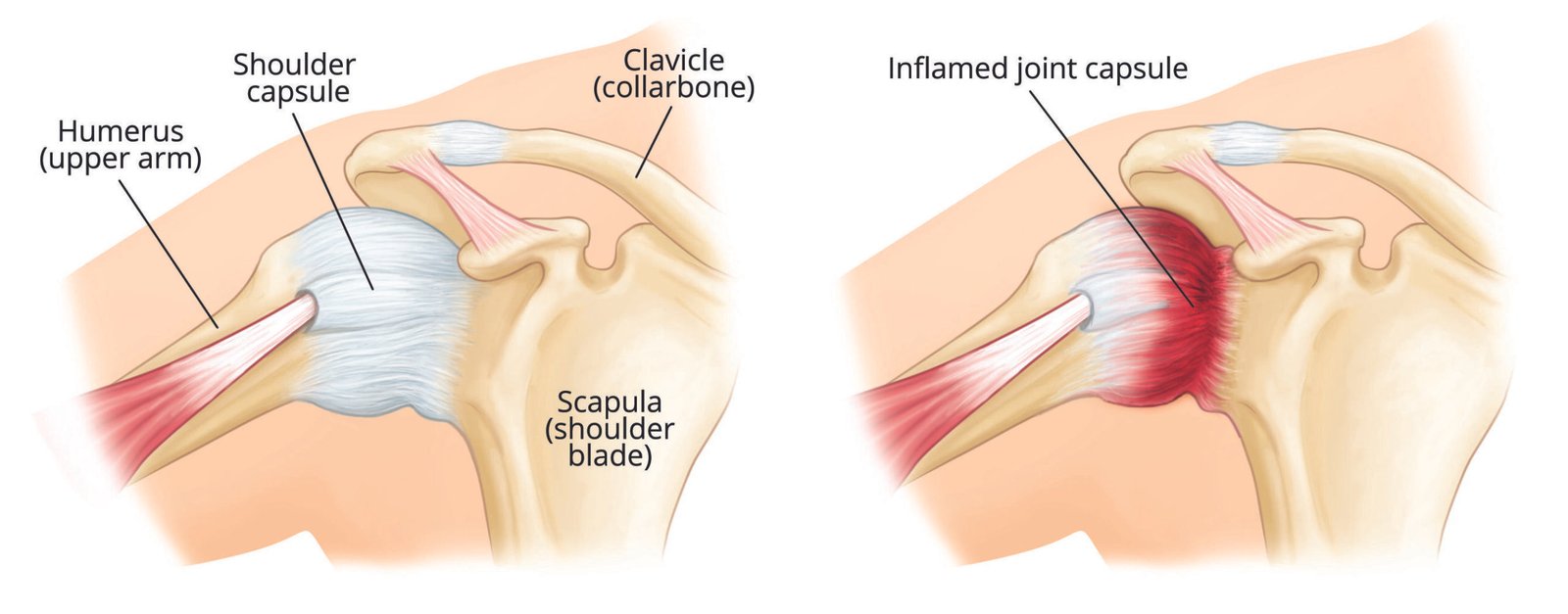Adhesive capsulitis, another name for frozen shoulder, is a painful and stiff shoulder joint. Over time, it can significantly impair the range of motion, making everyday activities challenging. Residents of Delhi dealing with this condition can find effective relief through non-surgical treatments provided by Dr. Smita Gulati, an expert in pain relief and musculoskeletal conditions. This article delves into the causes, symptoms, and non-surgical treatment options for frozen shoulder Treatment in Delhi at Dr. Smita Gulati’s clinic.
Understanding Frozen Shoulder
Frozen shoulder develops in three stages: freezing, frozen, and thawing. Each stage comes with its own set of symptoms and challenges:
- Freezing Stage: The shoulder becomes increasingly painful, and movement becomes limited. There are six weeks to nine months at this stage.
- Frozen Stage: Pain may begin to diminish, but the shoulder remains stiff. This stage can last from four to six months.
- Thawing Stage: The shoulder slowly regains its range of motion. This stage can last from six months to two years.
Causes and Risk Factors
The exact cause of a frozen shoulder is not fully understood, but it is often associated with the following risk factors:
- Age and Gender: Most commonly affects people between the ages of 40 and 60, with women being more prone to the condition.
- Diabetes: Individuals with diabetes are at a higher risk of developing a frozen shoulder.
- Immobilization: Prolonged immobilization of the shoulder due to injury, surgery, or other conditions can lead to a frozen shoulder.
- Other Health Conditions: Conditions such as thyroid disorders, Parkinson’s disease, and cardiovascular disease may increase the risk.
Symptoms of Frozen Shoulder
The primary symptoms of a frozen shoulder include:
- Pain: Persistent and aching pain in the shoulder, which may worsen at night.
- Stiffness: Reduced range of motion in the shoulder joint, making it difficult to perform everyday activities.
- Limited Mobility: Difficulty moving the shoulder, particularly with movements that involve lifting the arm or reaching behind the back.
Diagnosis of Frozen Shoulder
Accurate diagnosis is crucial for effective treatment. At Dr. Smita Gulati’s clinic in Delhi, the diagnostic process includes:
- Medical History Review: Assessing the patient’s medical history and any underlying conditions that could contribute to frozen shoulder.
- Physical Examination: Evaluating the shoulder’s range of motion and identifying areas of pain and stiffness.
- Imaging Tests: Utilizing imaging techniques such as X-rays or MRI to rule out other conditions like arthritis or rotator cuff tears.
Non-Surgical Treatment Options for Frozen Shoulder
Dr. Smita Gulati offers a variety of non-surgical treatments to alleviate the symptoms of a frozen shoulder and restore mobility. These treatments are tailored to the specific needs of each patient, ensuring the best possible outcomes.
1. Physical Therapy
The mainstay of care for a frozen shoulder is physical therapy. It involves exercises and techniques designed to improve shoulder mobility and reduce pain:
- Stretching Exercises: Gentle stretching exercises help increase the range of motion in the shoulder joint.
- Strengthening Exercises: Strengthening the muscles around the shoulder can improve stability and function.
- Manual Therapy: Hands-on techniques performed by a physical therapist to mobilize the shoulder joint and reduce stiffness.
2. Medications
Medications can help manage pain and inflammation associated with a frozen shoulder:
- Pain Relievers: Over-the-counter pain relievers such as acetaminophen or NSAIDs (non-steroidal anti-inflammatory drugs) can alleviate pain.
- Anti-inflammatory Medications: Prescription medications may be recommended to reduce inflammation and pain.
3. Corticosteroid Injections
Corticosteroid injections can provide significant relief from pain and inflammation:
- Intra-articular Injections: Administering corticosteroids directly into the shoulder joint to reduce inflammation and improve mobility.
- Bursa Injections: Injecting corticosteroids into the bursa (a fluid-filled sac that reduces friction) to alleviate pain.
4. Hydrodilatation
Hydrodilatation, also known as distension arthrography, is a procedure where a sterile fluid is injected into the shoulder joint to stretch the joint capsule:
- Fluid Injection: The injection helps expand the shoulder joint, breaking up adhesions and improving range of motion.
- Guided Procedure: Typically performed under imaging guidance to ensure accuracy and effectiveness.
5. Heat and Cold Therapy
Heat and cold therapy can be used to manage pain and inflammation:
- Heat Therapy: Applying heat to the shoulder can relax muscles and increase blood flow, aiding in pain relief and improved mobility.
- Cold Therapy: Using ice packs can reduce inflammation and numb the painful area.
6. Transcutaneous Electrical Nerve Stimulation (TENS)
TENS is a non-invasive method of pain relief:
- Electrical Stimulation: Using a TENS device, electrical impulses are delivered to the affected area, which can help reduce pain signals and promote healing.
Lifestyle Modifications and Self-Care
In addition to the treatments provided at Dr. Smita Gulati’s clinic, patients are encouraged to adopt lifestyle modifications and self-care practices to support their recovery:
- Regular Exercise: Engaging in regular physical activity can help maintain shoulder mobility and prevent stiffness.
- Ergonomic Adjustments: Making ergonomic adjustments at work and home to avoid strain on the shoulder.
- Healthy Diet: Maintaining a balanced diet to support overall health and healing.
The Role of Patient Education
Patient education is a critical component of frozen shoulder treatment. Dr. Smita Gulati emphasizes the importance of educating patients about their condition and involving them in their treatment plan:
- Understanding the Condition: Educating patients about the causes, symptoms, and stages of frozen shoulder.
- Treatment Expectations: Providing information on what to expect from various treatment options and the typical timeline for recovery.
- Self-Management Strategies: Teaching patients self-management strategies to manage symptoms and maintain shoulder health.
Comprehensive Care at Dr. Smita Gulati’s Clinic
Dr. Smita Gulati’s clinic in Delhi is dedicated to providing comprehensive and compassionate care for patients with frozen shoulders. The clinic’s approach includes:
- Personalized Treatment Plans: Tailored to meet the specific needs of each patient, considering their medical history and the severity of their condition.
- Expert Medical Team: A team of experienced professionals working together to provide holistic care.
- Advanced Diagnostic Tools: Utilizing the latest technology to accurately diagnose and monitor the condition.
- Patient-Centered Approach: Focusing on the patient’s overall well-being and quality of life.
Conclusion
While a frozen shoulder can be a crippling ailment, considerable alleviation, and increased mobility can be attained with appropriate non-surgical therapy. In Delhi, Dr. Smita Gulati offers expert care and a range of effective non-surgical treatments for frozen shoulder Treatment in Delhi. By combining physical therapy, medications, injections, and patient education, Dr. Gulati’s clinic provides a comprehensive approach to managing and overcoming frozen shoulder. If you or a loved one is dealing with a frozen shoulder, seeking expert care at Dr. Smita Gulati’s clinic can make a significant difference in your recovery journey.
For any further queries, Plz visit drsmitagulatipainrelief.com



